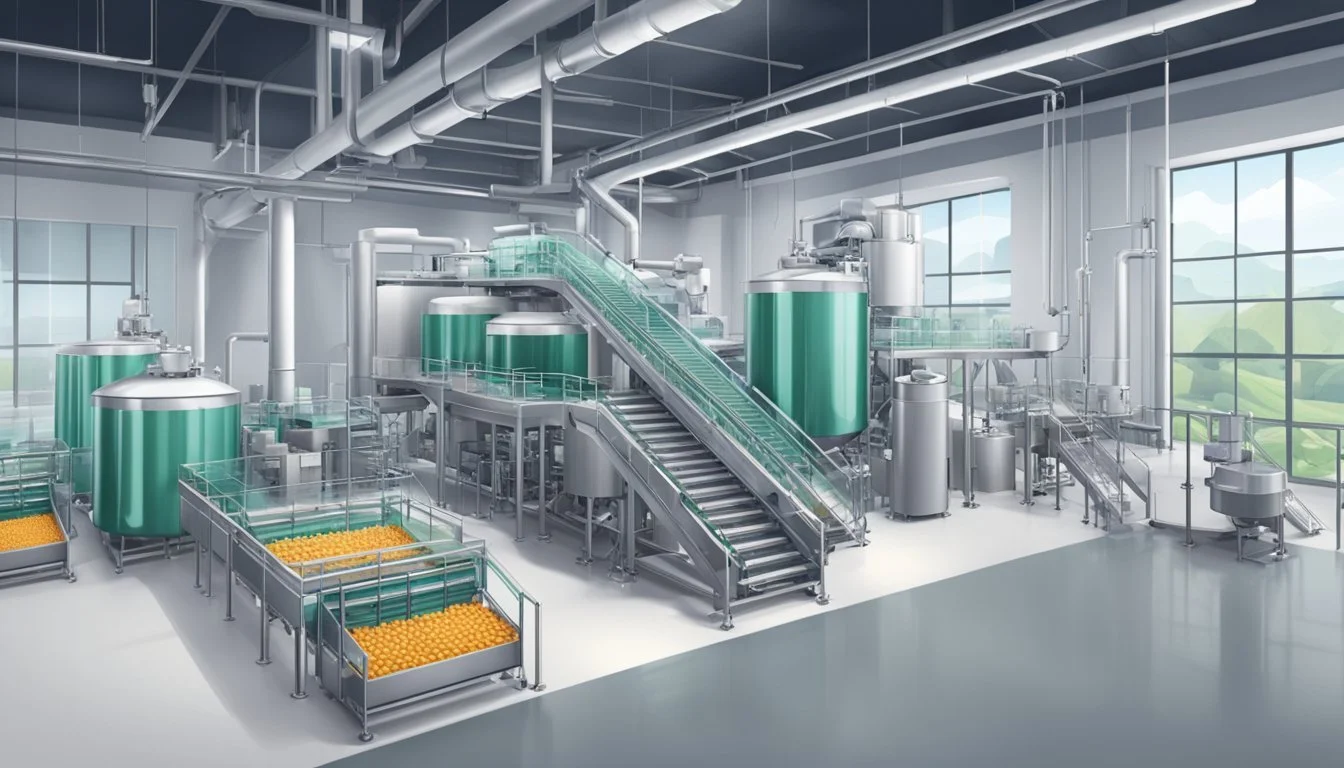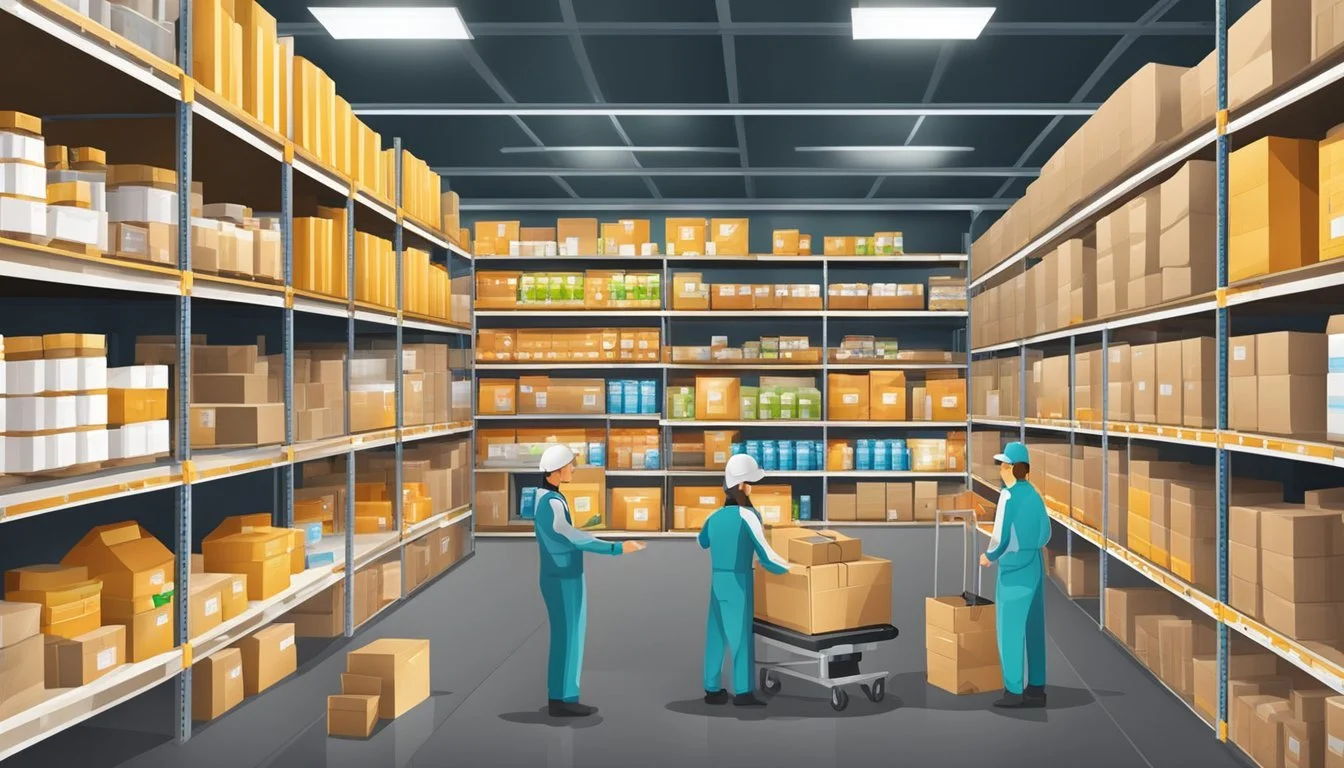Unlocking Profits: The Ultimate Guide to Vitamin Supplements Wholesale
Vitamin supplements have become a cornerstone of health and wellness routines for many individuals. As demand grows, businesses are increasingly turning to wholesale suppliers to stock their shelves with high-quality products at competitive prices. Wholesale vitamin supplements offer retailers and practitioners the opportunity to provide a wide range of nutritional options to their customers while maintaining healthy profit margins.
Reputable wholesale suppliers like Fullscript and BulkSupplements.com provide access to premium-grade vitamins, minerals, and other nutritional supplements in various forms including capsules, powders, and liquids. These suppliers often carry products from well-known brands as well as private label options, allowing businesses to cater to different customer preferences and price points.
For health food stores, pharmacies, and wellness centers, partnering with a reliable wholesale supplement provider can be a game-changer. It enables them to offer a diverse selection of vitamins and supplements, from essential daily multivitamins to specialized formulations targeting specific health concerns. This approach not only meets customer needs but also positions businesses as comprehensive health and wellness destinations.
Understanding Vitamin Supplements
Vitamin supplements play a crucial role in supporting overall health and well-being. These nutritional products come in various forms and offer specific benefits to address different health needs.
Types of Vitamin Supplements
Vitamin supplements are available in diverse formulations. Multivitamins combine essential nutrients in a single product. Single-vitamin supplements focus on specific needs, like Vitamin D for bone health or Vitamin C for immune support.
Capsules are a popular form, offering easy swallowing and efficient absorption. Tablets provide a cost-effective option for many consumers. Liquid vitamins offer an alternative for those who struggle with pills.
Gummy vitamins have gained popularity, especially among children and adults who prefer a more palatable option. Powdered supplements can be mixed into drinks or foods for convenient consumption.
Benefits of Nutritional Supplements
Vitamin supplements can fill nutritional gaps in one's diet. They support various bodily functions, from maintaining strong bones to boosting immune health.
For individuals with specific dietary restrictions, supplements ensure adequate nutrient intake. Athletes often use them to enhance performance and recovery.
Prenatal vitamins are essential for expectant mothers, supporting fetal development. Seniors may benefit from supplements that address age-related nutritional needs.
Some supplements aid in managing chronic conditions. For example, omega-3 fatty acids may help with heart health, while probiotics support digestive wellness.
It's important to note that supplements should complement, not replace, a balanced diet. Consulting a healthcare professional before starting any supplement regimen is advisable.
The Wholesale Landscape
The vitamin supplement wholesale industry involves key players like manufacturers, distributors, and suppliers. These entities work together to bring products to market efficiently and cost-effectively.
Manufacturer vs Distributors
Manufacturers produce vitamin supplements in large quantities. They formulate, test, and package products according to regulatory standards. Distributors act as intermediaries between manufacturers and retailers. They purchase supplements in bulk and sell to various businesses.
Manufacturers often offer private label options. This allows retailers to sell supplements under their own brand. Distributors provide a wider product selection from multiple manufacturers. They offer flexible ordering and faster shipping times.
Some large supplement companies act as both manufacturers and distributors. This vertical integration can lead to cost savings and better quality control.
Role of Suppliers in Wholesale
Suppliers source raw ingredients for vitamin supplement production. They ensure consistent quality and availability of essential components. Suppliers work closely with manufacturers to meet specific formulation requirements.
Many suppliers offer customization options. This includes unique blends, specialized packaging, and white label services. They often provide technical support and product development assistance.
Establishing a wholesale account with suppliers can lead to volume discounts. It also grants access to exclusive product lines and industry insights. Suppliers play a crucial role in product innovation and market trends.
Establishing a Wholesale Account
Securing a wholesale account with vitamin supplement suppliers offers significant advantages for businesses. The process involves meeting specific requirements and unlocking valuable benefits that can boost profitability and streamline operations.
Requirements for Wholesale Pricing
To qualify for wholesale pricing, businesses typically need to meet certain criteria. Many suppliers require proof of a legitimate business, such as a resale certificate or business license. Some may set minimum order quantities or dollar amounts for initial and subsequent purchases.
Vimergy and BulkSupplements.com specify that applicants must be in a business that manufactures or sells supplements, or uses them to service the public. This can include supplement manufacturers, farms, laboratories, and cosmetic companies.
Vitamin Friends requests a signed Authorized Reseller Agreement and MAP Policy. Applicants should also prepare their Reseller Certificate and Business Permit for submission with their application.
Benefits of a Wholesale Account
A wholesale account provides access to discounted pricing, enabling higher profit margins. Businesses can offer competitive retail prices while maintaining profitability. Bulk purchasing options often become available, reducing per-unit costs.
Wholesale accounts frequently come with dedicated customer support. This can include assistance with product selection, ordering, and technical questions. Some suppliers offer exclusive access to new products or formulations before they reach the general market.
Many wholesalers provide marketing materials and product information to support sales efforts. This can include high-quality images, detailed product descriptions, and educational resources for customers.
Streamlined ordering processes are common, with features like online portals for easy reordering and inventory management. Some suppliers may offer extended payment terms or volume-based incentives to wholesale customers.
Quality and Manufacturing
Quality control and manufacturing processes are crucial aspects of the vitamin supplement wholesale industry. They ensure products meet safety and efficacy standards while maintaining consistency across batches.
Ensuring Quality in Supplements
Reputable supplement manufacturers implement stringent quality control measures. These include sourcing high-grade raw materials from trusted suppliers. Ingredients undergo rigorous testing for purity and potency before use in production.
Third-party laboratory testing verifies product quality and label accuracy. This involves analyzing supplements for contaminants, heavy metals, and microbial content. Certificates of analysis document test results, providing transparency to buyers.
Quality assurance teams monitor every stage of production. They conduct regular audits and maintain detailed records. This ensures compliance with Good Manufacturing Practices (GMP) set by regulatory bodies.
The Manufacturing Process
The supplement manufacturing process begins with formulation development. Skilled scientists create precise recipes based on nutritional research and regulatory guidelines.
Raw materials are carefully weighed and blended according to the formula. Advanced mixing equipment ensures uniform distribution of ingredients. For tablets, the mixture is compressed into shape. Capsules are filled with powdered or liquid formulations.
Packaging is the final step. Bottles, blister packs, or sachets protect products from environmental factors. Labels provide essential information on ingredients, dosage, and expiration dates.
Throughout production, in-process checks verify product quality. This includes weight checks, hardness testing for tablets, and dissolution tests. These measures guarantee consistency and efficacy in the final product.
Marketing to Customers
Effective marketing strategies are crucial for vitamin supplement wholesalers to reach and engage customers. Tailoring approaches to address specific needs and building trust through quality products are key components of successful customer outreach.
Identifying Customer Needs
Vitamin supplement wholesalers must research and understand their target market. Analyzing customer demographics, health concerns, and buying habits helps create targeted marketing campaigns.
Surveys and focus groups provide valuable insights into customer preferences. This data informs product development and marketing messages.
Segmenting customers based on age, lifestyle, or health goals allows for personalized marketing. For example, elderberry supplements may be promoted to those seeking immune support.
Tracking industry trends and emerging nutritional research helps anticipate future customer needs. Staying ahead of the curve positions wholesalers as industry leaders.
Building Trust with Quality Products
Transparency in ingredient sourcing and manufacturing processes builds customer confidence. Sharing information about quality control measures and certifications demonstrates commitment to excellence.
Third-party testing and certifications provide credibility. Displaying these credentials prominently in marketing materials reassures customers of product safety and efficacy.
Customer testimonials and case studies showcase real-world results. Sharing success stories helps potential buyers envision the benefits of the supplements.
Educating customers about proper usage and potential interactions with food or medications demonstrates responsibility. This approach positions the wholesaler as a trusted health partner.
Offering samples or money-back guarantees reduces perceived risk for new customers. These strategies encourage trial and build long-term loyalty.
Business Operations
Effective business operations are crucial for vitamin supplement wholesalers to thrive in a competitive market. Streamlined processes and strategic planning enable companies to meet customer demands efficiently while maximizing profitability.
Inventory Management Strategies
Successful vitamin supplement wholesalers implement robust inventory management systems. These systems track stock levels, monitor expiration dates, and forecast demand. Many wholesalers use just-in-time inventory methods to reduce storage costs and minimize waste.
Batch tracking ensures product quality and facilitates recalls if necessary. Some companies employ automated reordering systems to maintain optimal stock levels. Regular audits help identify slow-moving items and prevent overstocking.
Wholesalers often partner with multiple suppliers to ensure a steady supply chain. This approach reduces the risk of stockouts and allows for competitive pricing. Many businesses use inventory management software to integrate with their accounting and sales systems for real-time data analysis.
Logistics of Free Shipping
Free shipping has become a key differentiator in the vitamin supplement wholesale industry. Wholesalers often set minimum order values to offset shipping costs while encouraging larger purchases. Some companies build shipping costs into their product pricing structure.
Many wholesalers partner with multiple carriers to negotiate better rates and ensure reliable delivery. They may use zone-based pricing to manage costs for distant locations. Fulfillment centers in strategic locations can reduce shipping times and costs.
Some wholesalers offer tiered shipping options, with free shipping for orders above a certain threshold. They may also provide expedited shipping at an additional cost. Efficient packaging practices help minimize dimensional weight charges and reduce overall shipping expenses.
Online Presence
Establishing a strong online presence is crucial for vitamin supplement wholesalers to reach a wider audience and increase sales. Digital platforms offer unique opportunities to showcase products and connect with potential buyers.
Leveraging E-Commerce Platforms
E-commerce platforms provide vitamin supplement wholesalers with powerful tools to sell their products online. Many wholesalers, including bulksupplements.com, utilize these platforms to reach a global customer base.
These platforms offer features like product listings, secure payment processing, and inventory management. Wholesalers can create detailed product descriptions, high-quality images, and customer reviews to build trust and credibility.
Integration with popular marketplaces like Amazon or Alibaba can further expand reach. Some platforms also offer dropshipping options, allowing wholesalers to fulfill orders directly to end customers on behalf of retailers.
Maximizing Exposure on Digital Channels
Digital marketing channels are essential for increasing visibility and attracting potential buyers. Wholesalers can use search engine optimization (SEO) techniques to improve their website's ranking for relevant keywords.
Social media platforms provide opportunities to engage with customers and share product information. Many wholesalers use platforms like LinkedIn for B2B networking and Instagram for visual product showcases.
Email marketing campaigns can nurture leads and keep customers informed about new products or promotions. Content marketing through blogs or videos can establish thought leadership and educate potential buyers about supplement benefits and industry trends.
Pay-per-click advertising on search engines and social media platforms can drive targeted traffic to wholesale websites, increasing visibility and sales opportunities.
Regulations and Compliance
The vitamin supplements wholesale industry operates under strict regulations to ensure product safety and quality. Compliance with these standards is crucial for maintaining consumer trust and legal operations.
Navigating Industry Regulations
The FDA oversees dietary supplement regulations in the United States. Manufacturers must follow current Good Manufacturing Practices (cGMPs) to ensure product quality. These practices cover various aspects of production, including testing, packaging, and labeling.
Structure/function claims on supplements require FDA notification within 30 days of marketing. The FDA also monitors adverse event reports related to supplement use. Wholesalers must verify that their suppliers comply with these regulations.
Third-party certifications, such as NSF International or USP, can provide additional assurance of product quality and compliance. These certifications often involve rigorous testing and auditing processes.
Maintaining Compliance in Wholesale
Wholesalers play a crucial role in maintaining regulatory compliance throughout the supply chain. They must keep detailed records of product sources, batch numbers, and distribution channels. This documentation helps ensure traceability in case of recalls or quality issues.
Regular supplier audits are essential to verify compliance with cGMPs and other regulations. Wholesalers should establish clear quality control procedures, including testing incoming products for purity and potency.
Staying informed about regulatory updates is critical. Wholesalers can subscribe to FDA notifications and industry publications to keep abreast of changes. Implementing a robust compliance management system helps track and meet regulatory requirements consistently.









